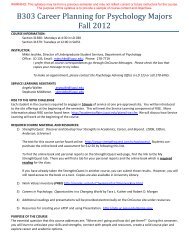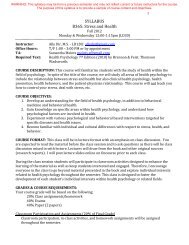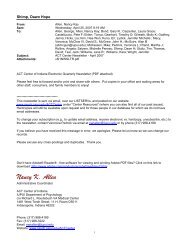Supported Employment: Training Frontline Staff - SAMHSA Store ...
Supported Employment: Training Frontline Staff - SAMHSA Store ...
Supported Employment: Training Frontline Staff - SAMHSA Store ...
You also want an ePaper? Increase the reach of your titles
YUMPU automatically turns print PDFs into web optimized ePapers that Google loves.
Having a crisis on the job<br />
Bonita’s story<br />
Bonita has been working as a mail distributor at a<br />
large company. She has a diagnosis of schizophrenia,<br />
but has not had a relapse since starting this job several<br />
years ago.<br />
Yesterday she did not show up at work. Today, she<br />
is slapping the mail down on people’s desks and<br />
muttering under her breath.<br />
The employer calls her employment specialist saying<br />
he is getting calls from all over the building. He<br />
sounds frightened on the phone and wants to fire<br />
Bonita.<br />
Tackling the issues<br />
Q: If you were Bonita’s employment<br />
specialist, what would you do<br />
While there is no single correct answer for handling<br />
Bonita’s situation, here are several reasonable<br />
approaches that you could take:<br />
Interventions aimed at the consumer<br />
With a release of information, employment<br />
specialists can talk with employers when problems<br />
occur on the job. In this example, since you have<br />
Bonita’s permission to speak with her employer, you<br />
could thank the boss for calling and provide some<br />
reassuring information.<br />
Tell the employer that Bonita has lived with<br />
her illness for many years and has no history of<br />
aggression. Then offer to go over to the workplace<br />
to try to figure out what is going on. You may say,<br />
It would be a shame if she lost her job after years<br />
of service, without looking into it first.<br />
The offer of an onsite, immediate visit often helps<br />
calm employers in crisis situations. Visiting the<br />
worksite allows you to assess Bonita and the work<br />
situation. Is Bonita having increased symptoms,<br />
such as talking to herself and pacing in the<br />
cafeteria How are other employees responding to<br />
her<br />
Q: How would you address supports<br />
related to the Bonita, her network,<br />
and workplace<br />
Assess whether another team member needs<br />
to evaluate Bonita. If Bonita is unable to return<br />
to work right away, arrange sick leave with her<br />
employer.<br />
Interventions aimed at the consumer’s<br />
support network<br />
People in a consumer’s support network may<br />
function positively or negatively in their supportive<br />
role. Assess the supports that Bonita is receiving.<br />
How are people in Bonita’s support network<br />
affecting the crisis situation<br />
Find out what stressors are causing Bonita’s<br />
symptoms to escalate. When Bonita feels ready to<br />
talk about the situation, ask her about stressors. In<br />
this case, she’ll reveal that over the last month, her<br />
Module 34 6 Job Assessment Supports and and Collaborations<br />
Job Finding
















